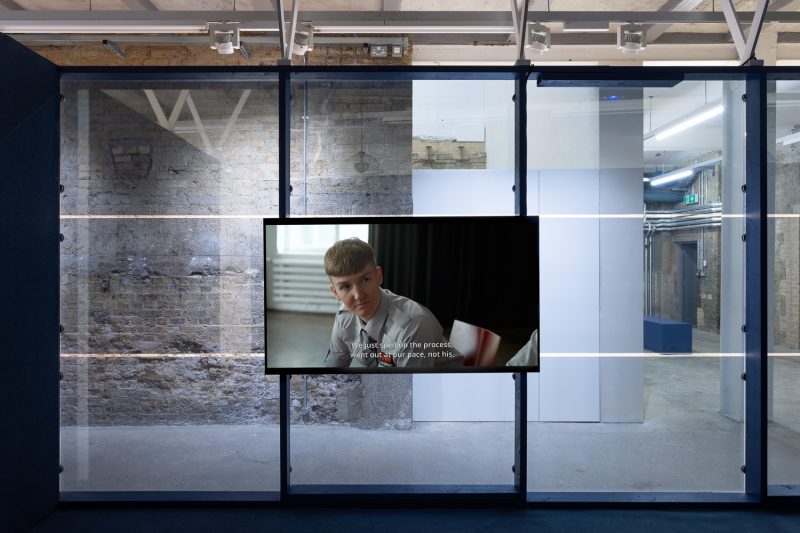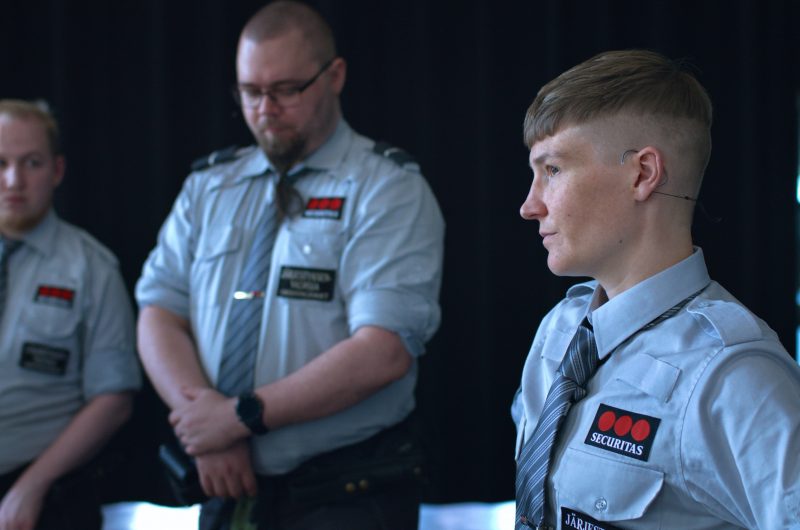TALK: Excess Force
This event took place on 23 May 2023.
Moderated by Jennifer Fleetwood (Goldsmiths College), a panel including Dr Koshka Duff (Author, Abolish the Police, Lecturer, Nottingham University), Thomas Marriott (Designer and Researcher, Goldsmiths College), and Dr Nikhaela Wicks (University of Kent), focus on the use of excess force and other forms of violence that can typify interactions with private security and police forces. Amidst recent revelations about the working culture at the MET, failing detention centers, and questions around far-right actions, the question of how well communities are cared for and served by existing systems of policing and security are ever present. Is reform possible, or do we need to radically rethink?
BIOGRAPHIES
Dr Koshka Duff is a lecturer in political philosophy at the University of Nottingham and campaigns against police strip search abuse. She is editor of the recent collection, Abolishing the Police (An Illustrated Introduction). Her current research looks at how the derogatory concept of ‘the criminal’ functions to exclude dissenting voices from the sphere of recognised political contestation.
Jennifer Fleetwood is a criminologist and sociologist whose research and writing centres on women, gender, and crime/law-breaking. She has used an array of research methods, including ethnography and interviews to understand women’s involvement in drug trafficking as mules and as street level drug dealers.Her book titled Drug Mules: Women in the international cocaine trade (winner of the British Society of Criminology Book prize, 2015). Along with John Lea, she has recently written about defunding the police in the UK.
Thomas Marriott has recently completed a PhD in Design at Goldsmiths. His research, which examines use of body-worn video cameras by police in England and Wales, sits at the intersection of design and social research and draws on design, sociology, and science and technology studies. The project involved the design and production of research devices which were used with police officers during fieldwork as a way of facilitating and prompting conversations about the multiple roles of capturing technologies within policing. He is interested in how design can be used as a tool to critically question the role and implications of technology in societies.
Dr Wicks is a Lecturer in Criminology and she joined the School of Social Policy, Sociology and Social Research at the University of Kent in September 2021. Prior to this, she taught at the University of Portsmouth and the University of Westminster. She holds a PhD in Sociology, an MA in Criminology and a BA in Criminology and Social Policy. Dr Wicks’s interests are in policing (both public and private forms), ‘race’ and nightlife and she is a keen ethnographer. Drawing upon over 300 hours of observations alongside the police, door staff, private security firms, venue managers and street pastors, her doctoral research reveals how ‘race’ is integral to police notions of social order and the impact this has for racially minoritized night-time revellers. Despite this, those who police nightlife deny racism and employ colour-blind rhetorics in their narratives of work. Recently, her publications have drawn attention to the discriminatory and racist ways in which young Black male performers and promoters are governed through temporary event notice applications, as well as the policing of Drill and grime night-time events.
This event took place on 23 May 2023.
Moderated by Jennifer Fleetwood (Goldsmiths College), a panel including Dr Koshka Duff (Author, Abolish the Police, Lecturer, Nottingham University), Thomas Marriott (Designer and Researcher, Goldsmiths College), and Dr Nikhaela Wicks (University of Kent), focus on the use of excess force and other forms of violence that can typify interactions with private security and police forces. Amidst recent revelations about the working culture at the MET, failing detention centers, and questions around far-right actions, the question of how well communities are cared for and served by existing systems of policing and security are ever present. Is reform possible, or do we need to radically rethink?
BIOGRAPHIES
Dr Koshka Duff is a lecturer in political philosophy at the University of Nottingham and campaigns against police strip search abuse. She is editor of the recent collection, Abolishing the Police (An Illustrated Introduction). Her current research looks at how the derogatory concept of ‘the criminal’ functions to exclude dissenting voices from the sphere of recognised political contestation.
Jennifer Fleetwood is a criminologist and sociologist whose research and writing centres on women, gender, and crime/law-breaking. She has used an array of research methods, including ethnography and interviews to understand women’s involvement in drug trafficking as mules and as street level drug dealers.Her book titled Drug Mules: Women in the international cocaine trade (winner of the British Society of Criminology Book prize, 2015). Along with John Lea, she has recently written about defunding the police in the UK.
Thomas Marriott has recently completed a PhD in Design at Goldsmiths. His research, which examines use of body-worn video cameras by police in England and Wales, sits at the intersection of design and social research and draws on design, sociology, and science and technology studies. The project involved the design and production of research devices which were used with police officers during fieldwork as a way of facilitating and prompting conversations about the multiple roles of capturing technologies within policing. He is interested in how design can be used as a tool to critically question the role and implications of technology in societies.
Dr Wicks is a Lecturer in Criminology and she joined the School of Social Policy, Sociology and Social Research at the University of Kent in September 2021. Prior to this, she taught at the University of Portsmouth and the University of Westminster. She holds a PhD in Sociology, an MA in Criminology and a BA in Criminology and Social Policy. Dr Wicks’s interests are in policing (both public and private forms), ‘race’ and nightlife and she is a keen ethnographer. Drawing upon over 300 hours of observations alongside the police, door staff, private security firms, venue managers and street pastors, her doctoral research reveals how ‘race’ is integral to police notions of social order and the impact this has for racially minoritized night-time revellers. Despite this, those who police nightlife deny racism and employ colour-blind rhetorics in their narratives of work. Recently, her publications have drawn attention to the discriminatory and racist ways in which young Black male performers and promoters are governed through temporary event notice applications, as well as the policing of Drill and grime night-time events.
Read Less...

